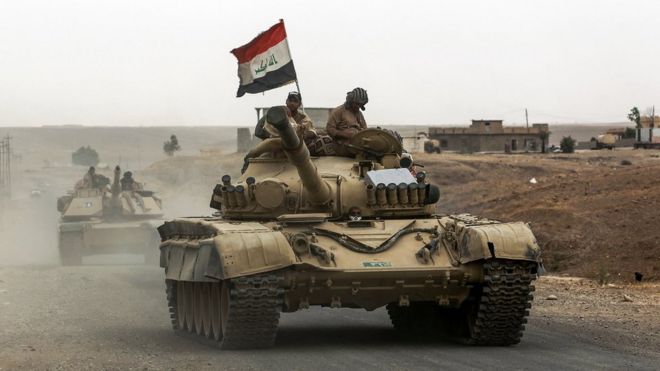An Iraqi tank battling ISIS. BBC/AFP.
Iraqi forces have launched an offensive on Hiwija, one of the last areas ISIS controls in the country. BBC. The small city is located north of Baghdad and is the only part of the country that ISIS controls except for the western deserts. Those desert holdouts are also under attack as well with the town of Ana already falling to Iraqi forces. Hiwija has long been a stronghold for Sunni insurgents for more than a decade but ISIS forces have been cut off from the main ISIS force for a year.
My Comment:
The fight against ISIS in Iraq is in its final phase. Hiwija is about the last major outpost ISIS has in Iraq. Other than that, ISIS only controls some of the border outposts next to Syria. They have been pushed out of their major strongholds, including their former de-facto capital of Mosul. Soon, they will have nothing left at all.
I am expecting that the battle for Hiwija to be fast. Mosul did not last anywhere near as long as I thought and the battle for Tal-Afar went even quicker. Considering Hiwija has been cut off from other ISIS forces for more than a year, they have to be running low on morale and supplies. I expect them to fold quickly. I think we are past the point of months long drawn out battles with ISIS. They are just too weak these days.
That doesn't mean I expect them not to fight. I doubt many of these ISIS fighters are considering surrendering. Many of them are true believers and think that death in battle is their ticket to paradise. Some of them might be foreign fighters who understand that they can't go home again. Others may fear, quite correctly, that some of the Shiite fighters arrayed against them will show them no mercy. Either way, I expect most of the fighters in Hiwija to die.
The BBC post made a big deal about all the civilians left in the Hiwija area. I am not too concerned. As I have said many times before, one of the reasons why ISIS is falling so quickly is the fact that we aren't so terrified of inflicting civilian casualties. I have said for months now that it is better to inflict a few civilian casualties now so the war doesn't last quite as long and so far I have been proven correct.
The big question now is what happens after Iraq is fully liberated. Given the fast pace of battles and the almost total collapse of ISIS, I expect that to happen before the end of this year, with only a few holdouts remaining. ISIS will still exist in Iraq but they won't hold much in the way of territory. They won't be anywhere near the force they once were.
So what is the future of ISIS in Iraq? I am guessing the survivors will either flee to Syria or revert to the guerrilla force they were before they started taking territory. Instead of trying to take and hold territory, they will try to commit terror attacks, much like they do throughout the rest of the world. They will still be a major threat but Iraq itself should be much safer. There will still be commando raids and suicide bombings, but I doubt they will be able to recover as an actual fighting force.
As for Iraq, they will have to remain vigilant against ISIS and, more importantly, make sure that sectarian divisions don't undo the progress they have made. There is already tensions over Kurdish independence and though Sunni-Shia relations have improved, there are still many raw wounds there. I hope that Iraq can rise to the challenge and remain a stable and prosperous country, but we will have to wait and see...

No comments:
Post a Comment